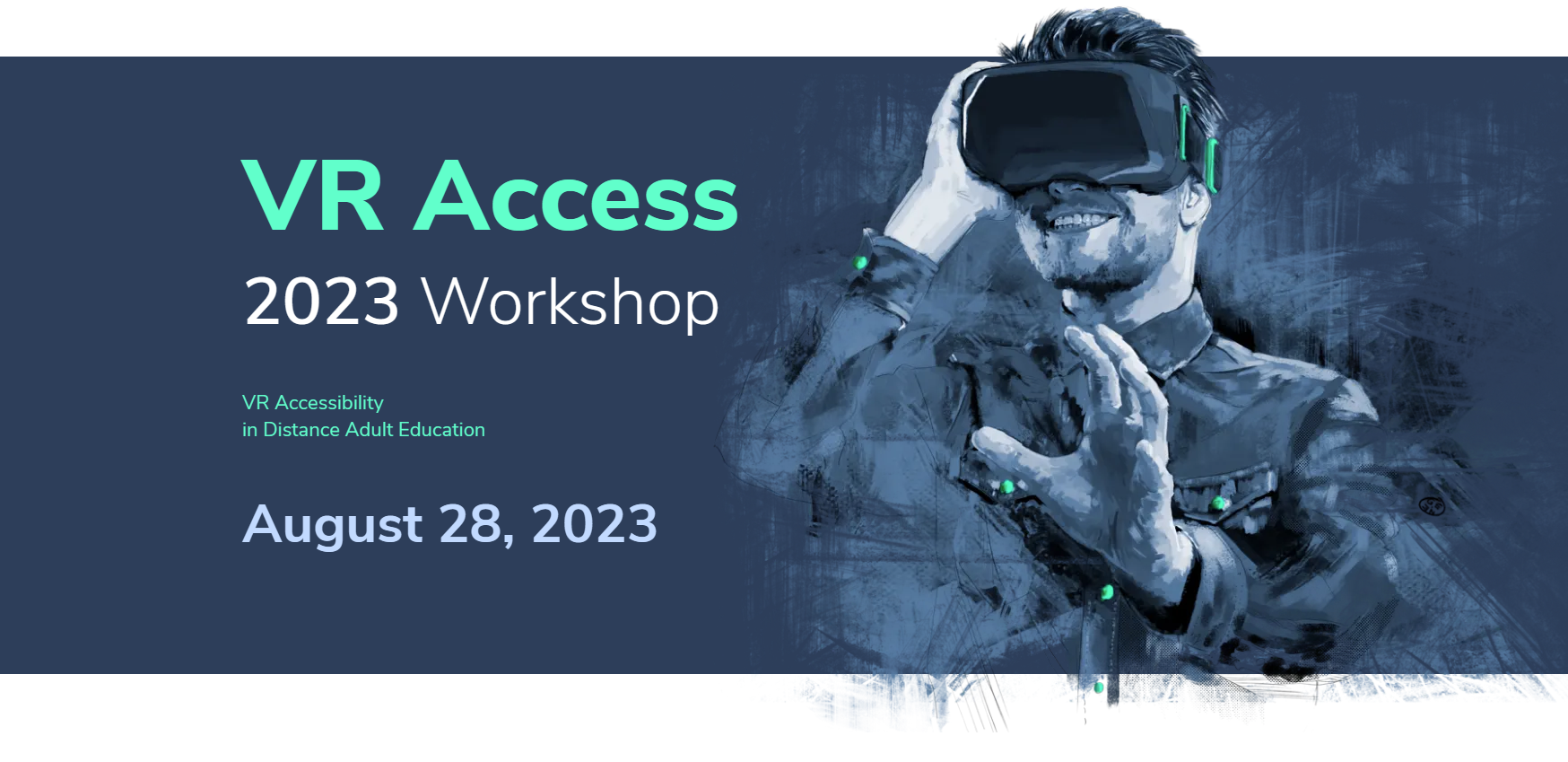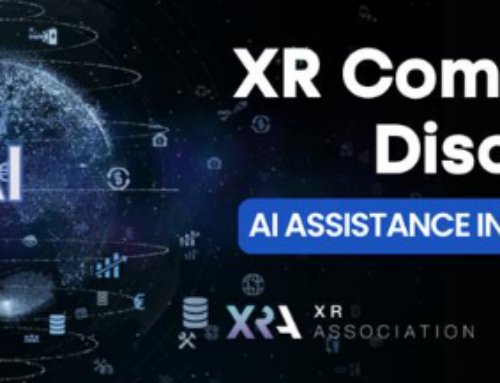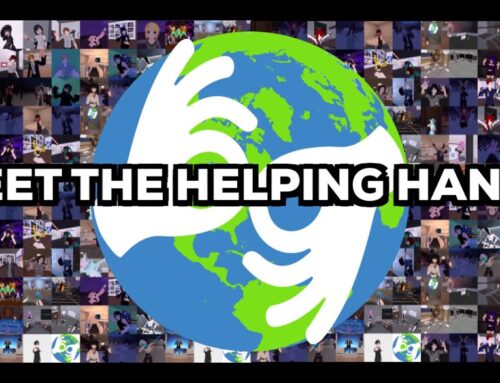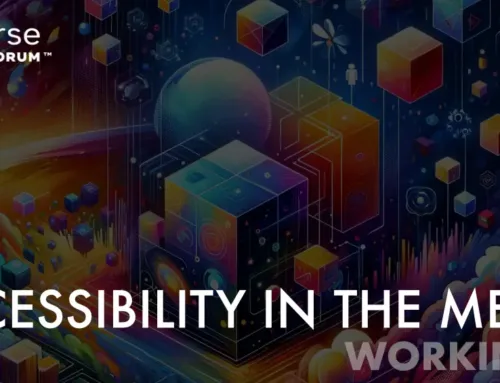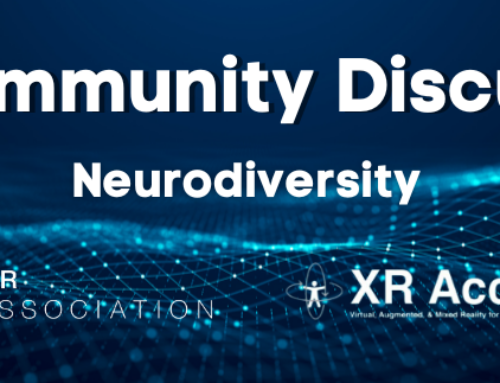August 28th, 2023
As virtual reality (VR) technology becomes more pervasive, it continues to find multiple new uses
beyond research laboratories. One of them is distance adult education—the potential of VR to
provide valuable education experiences is massive, despite the current barriers to its widespread
application. Nevertheless, recent trends demonstrate clearly that VR is on the rise in education
settings, and VR-only courses are becoming more popular across the globe. This trend will continue
as more affordable VR solutions are released commercially, increasing the number of education
institutions that benefit from the technology. No accessibility guidelines exist at present that are
created specifically for the implementation of specific accessibility features for VR hardware and
software in distance education. The purpose of this workshop is to address this niche and formulate
a set of practical guidelines and its implementations for the use of VR in distance adult education to
make it accessible to a wider range of people.
To make it happen we would like to invite researchers and practitioners who represent the fields of
distance education, virtual reality, and accessibility, as well as those with combined experience in
these areas. We encourage people that are interested in new forms of distance education to join our
debate on the opportunities and challenges of the application of VR in their fields—even if they lack
prior experience with the technology.
Event Details
Submissions
To participate for the workshop, we will ask you to prepare a short abstract (2–5 pages) containing:
- A short bio that includes your experience in distance education, virtual reality, and accessibility
- A short essay on at least one of the following topics:
• Real-life examples of in-person or software-mediated educational situations in which specific
accessibility features were absent or sorely needed.
• The pros and cons of specific tools and applications (e.g. text, video, or VR) for distance education
that the participant has used before. This point should be as detailed as possible with special
attention paid to accessibility features.
• Areas in which VR-based distance education can be more accessible than standard (in-person) or
remote video education.
• A description of powerful examples of VR accessibility features that the participant has used or
encountered in the broad range of VR applications, including VR games and experiences.
• An idea for a single new or modified software or hardware feature that could have a positive
impact in the creation of an accessible VR-based distance course or lesson.
• An idea for a course or lesson that the participant would like to conduct in VR, including the goal of
the course or lesson, a detailed schedule (topics and number of hours), teaching methods and
activities, forms of evaluation (e.g. assignments or tests/quizzes), and a reflection of challenges the
participant might encounter while conducting it.
You may also consider situations in which, temporarily or permanently, not all attendees have access
to VR headsets, which means that they must join using alternative means, such as voice, text, or
video communication using a desktop or a mobile phone with limited data.
Submissions have to be send to: b.muczynski@pm.szczecin.pl
Important dates:
1st August 2023 – submission deadline
10th August 2023 – acceptance confirmation
28th August 2023 – workshop
Requirements:
Although we encourage participants to use Oculus Quest 1, Meta Quest 2 (Formerly
Oculus Quest 2), or Meta Quest Pro to join the Horizon Workrooms Session via VR, it is also possible
for them to join solely via video using a computer.
Pre-workshop: A test session in Horizon Workrooms in VR will be held two days prior to the
workshop to allow participants to test their setups and to become familiar with the environment
before joining the VR session on the day of the workshop.
Participants: 12–20 (max. 16 via VR)
Cost:
This workshop is a part of INTERACT 2023 conference. Please find all details about the
conference and required payments on the conference website: https://interact2023.org/
Venue:
The workshop has been prepared with a VR component in mind, so each participant can take part in
a 1-hour VR session and experience distance learning in such environment. Apart from that we are
planning to use Zoom and collaborative tools like Miro to connect and collaborate.
We are in contact with conference organizers to provide a space to join the workshop from near the
venue for people that will attend INTERACT 2023 in person.
Organizers:
Katarzyna Abramczuk works at the Faculty of Sociology of the University of Warsaw. She is interested
in research at the intersection of sociology, mathematical modeling of social phenomena, cognitive
psychology, behavioural economics, and new technologies.
Cezary Biele is the head of the Laboratory of Interactive Technologies at OPI PIB. He is a
human–technology interaction researcher with a background in psychology, psychophysiology, and
computer science.
Zbigniew Bohdanowicz is a researcher at the Laboratory of Interactive Technologies at OPI PIB. He
works on the social aspects of technology development — specifically, its impact on individuals and
social networks.
Daniel Cnotkowski is a VR programmer at the Laboratory of Interactive Technologies at OPI PIB. He
works on VR applications for researchers. He is interested in how VR can become a mainstream
platform for research simulations.
Jazmin Collins is a PhD student at the Enhancing Ability Lab of Cornell University. Her research
focuses on both the evaluation and the development of emerging VR/augmented reality (AR)
technologies as accessible tools for blind/low vision communities. She is also a member of the XR
Access organization, which promotes accessibility in VR/AR.
Wieslaw Kopeć is a computer scientist and the head of XR Center at PJAIT and a member of Emotion-
Cognition Lab at SWPS University. He also cofounded the transdisciplinary Human Aspects in Science
and Engineering (HASE) research group and distributed LivingLab Kobo.
Jaroslaw Kowalski is an assistant professor at the Laboratory of Interactive Technologies at OPI PIB.
He is a sociologist and research specialist. His areas of interest include User Experience studies, the
sociology of innovation, and the social and psychological aspects of new technologies.
Thomas Logan is the owner of Equal Entry and has spent the past twenty years assisting
organizations to create technology solutions that work for people with disabilities. He has delivered
projects for numerous federal, state, and local government agencies as well as private sector
organizations.
Bartosz Muczyński is a researcher at the Maritime University of Szczecin, Poland, where he leads the
laboratory of VR and AR systems and serves as the head of the university’s E-learning Center. He also
works as a VR developer at OPI PIB.
Grzegorz Pochwatko is a leading expert in VR and psychophysiology. As the head of the Virtual
Reality and Psychophysiology Lab at IP PAS, he has dedicated his career to exploring the interactions
between virtual humans and co-presence in extended reality environments.
Kinga Skorupska is a researcher at the XR Center at PJAIT whose interests include UX Design and
science communication. She conducts research in collaborative ICT solutions and technology enhanced learning.
Tentative Schedule:
Part 1: Challenges and opportunities in using VR for diverse education cases (2 hours)
Goal: To zoom in on participants’ education contexts for VR distance education.
Activities during a Zoom video call:
– Ice-breaking: Welcome, introductions, and the plan of the workshop (15 minutes)
– Brief presentations of selected abstracts by participants (75 minutes)
– Moderated discussion and affinity diagramming of key insights (30 minutes)
Coffee break (15 minutes)
Part 2: Simulation of learning experience elements in hybrid
VR/video mode (1 hour)
Goal: To provide participants with a shared diverse VR learning experience using the most common
education activities
Activities in VR/video via Horizon Workrooms:
- Lecture: An overview of VR hardware and software accessibility guidelines (20 minutes)
- Work in groups: Analysing the accessibility challenges and opportunities of VR software based on
case-study-informed personas (20 minutes) - Brainstorming: Gathering group insights on the shared board (20 minutes)
Lunch break (60 minutes)
Part 3: Conclusions and Follow-up (2 hours)
Goal: To formulate guidelines for VR distance education and to discuss the next steps
Activities in a Zoom video call:
- Group work: Discussing the quality of the shared hybrid VR experience from Part 2 on Jamboard (30
minutes) - Brainstorming session led by a facilitator to gather insights on diverse accessibility guidelines for
the instructional design of education experiences in VR, including curriculum design, activities used,
and evaluation methods (70 minutes) - Discussion of the next steps for the post-workshop multi-author publication (10 minutes)
- Final remarks, thank-yous, and scheduling of the follow-up meeting (10 minutes)
If you have any questions please contact workshop co-organizers: b.muczynski@pm.szczecin.pl; kinga.skorupska@pjwstk.edu.pl
